
The International Astronomical Union is a nongovernmental organisation with the objective of advancing astronomy in all aspects, including promoting astronomical research, outreach, education, and development through global cooperation. It was founded in 1919 and is based in Paris, France.
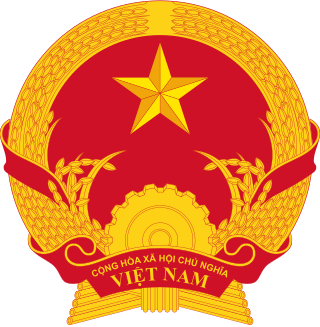
The politics of Vietnam is dominated by a single party, the Communist Party of Vietnam (CPV). The President of Vietnam is the head of state, and the Prime Minister of Vietnam is the head of government, both of these are separate from the General Secretary of the Communist Party of Vietnam who leads the Communist Party and is head of the Politburo and the Central Military Commission, thus the General Secretary is the de facto supreme leader of Vietnam. Executive power is exercised by the government and the President of Vietnam. Legislative power is vested in the National Assembly of Vietnam. The Judiciary is independent of the executive. The parliament adopted the current Constitution of Vietnam, its fifth, on 28 November 2013.
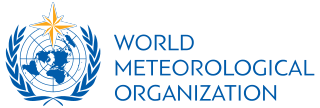
The World Meteorological Organization (WMO) is a specialized agency of the United Nations responsible for promoting international cooperation on atmospheric science, climatology, hydrology and geophysics.

The Pacific Community (PC), formerly the South Pacific Commission (SPC), is an international development organisation governed by 27 members, including 22 Pacific island countries and territories. The organisation's headquarters are in Nouméa, New Caledonia, and it has regional offices in Suva, Pohnpei, and Port Vila, as well as field staff in other locations in the Pacific. Its working languages are English and French. It primarily provides technical and scientific advice, and acts as a conduit for funding of development projects from donor nations. Unlike the slightly smaller Pacific Islands Forum, the SPC is not a trade bloc, and does not deal with military or security issues.

The South Asian Association for Regional Cooperation (SAARC) is the regional intergovernmental organization and geopolitical union of states in South Asia. Its member states are Afghanistan, Bangladesh, Bhutan, India, Maldives, Nepal, Pakistan, and Sri Lanka. SAARC comprises 3% of the world's land area, 21% of the world's population and 5.21% of the global economy, as of 2021.
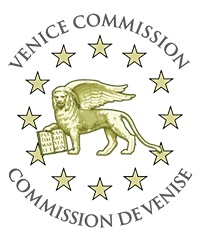
The Venice Commission, officially European Commission for Democracy through Law, is an advisory body of the Council of Europe, composed of independent experts in the field of constitutional law. It was created in 1990 after the fall of the Berlin Wall, at a time of urgent need for constitutional assistance in Central and Eastern Europe.
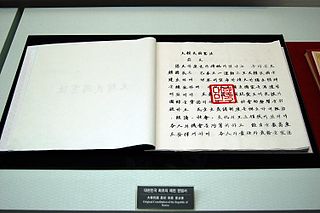
The Constitution of the Republic of Korea is the supreme law of South Korea. It was promulgated on July 17, 1948, and last revised on October 29, 1987.

The Constitutional Court of Korea is one of the highest courts—along with the Supreme Court—in South Korea's judiciary that exercises constitutional review, seated in Jongno, Seoul. The South Korean Constitution vests judicial power in courts composed of judges, which establishes the ordinary-court system, but also separates an independent constitutional court and grants it exclusive jurisdiction over matters of constitutionality. Specifically, Chapter VI Article 111(1) of the South Korean Constitution specifies the following cases to be exclusively reviewed by the Constitutional Court:
- The constitutionality of a law upon the request of the courts;
- Impeachment;
- Dissolution of a political party;
- Competence disputes between State agencies, between State agencies and local governments, and between local governments; and
- Constitutional complaints as prescribed by [the Constitutional Court] Act.

The Conference on Interaction and Confidence-Building Measures in Asia (CICA) is an inter-governmental forum for enhancing cooperation towards promoting peace, security and stability in Asia. It is a forum based on the recognition that there is a close link between peace, security and stability in Asia and in the rest of the world. The key idea of the Conference is based on the priority of the indivisibility of security, joint initiative and mutually beneficial interaction of small and large states.

The International Handball Federation (IHF) is the administrative and controlling body for handball and beach handball. IHF is responsible for the organisation of handball's major international tournaments, notably the IHF World Men's Handball Championship, which commenced in 1938, and the IHF World Women's Handball Championship, which commenced in 1957.

The Asia/Pacific Group on Money Laundering (APG) is a FATF style regional inter-governmental (international) body, the members of which are committed to effectively implementing the international standards against money laundering (AML), the financing of terrorism (CTF) and financing the proliferation of weapons of mass destruction. APG was founded in 1997 in Bangkok, Thailand, and currently consists of 41 member jurisdictions in the Asia-Pacific region and a number of observer jurisdictions and international/regional observer organisations.
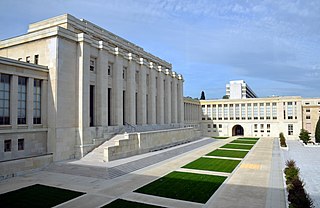
An international organization or international organisation, also known as an intergovernmental organization or an international institution, is a stable set of norms and rules meant to govern the behavior of states and other actors in the international system. Organizations may be established by a treaty or be an instrument governed by international law and possessing its own legal personality, such as the United Nations, the World Health Organization and NATO. International organizations are composed of primarily member states, but may also include other entities, such as other international organizations, firms, and nongovernmental organizations. Additionally, entities may hold observer status.

The International Organization of Supreme Audit Institutions (INTOSAI) is an intergovernmental organization whose members are supreme audit institutions. Nearly every supreme audit institution in the world is a member of INTOSAI. Depending on the type of system used in their home country, the members of INTOSAI may be variously titled the Chief Financial Controller, the Office of the Comptroller General, the Office of the Auditor General, the Court of Accounts, or the Board of Audit.

The Constitutional Court of the Republic of Indonesia is one of the apex courts in Indonesia along with the Indonesian Supreme Court. Its primary role is reviewing the constitutionality of statutes (undang-undang). It also has other functions, including resolving disputes over the powers of state institutions, settling disputes over the results of general elections, deciding on the dissolution of political parties, and supervising impeachment. The last two functions have never been exercised by the Court.
The Asia Pacific Forum (APF) is one of four regional networks of national human rights institutions (NHRIs) within the International Co-ordinating Committee of NHRIs. The APF formerly accredited NHRIs for compliance with the United Nations' Paris Principles, but now acknowledges the accreditation decisions of an ICC sub-committee on which the APF has one of the four (regional) seats.

The Constitutional Court of Armenia is the highest legal body for constitutional review in Armenia. It is responsible for supervising the constitutionality of laws and other legislative instruments. The law of the constitutional court is defined in the Armenian constitution and by statute. The court, established in 1995, is located in Yerevan.

Asset Recovery Interagency Network - Asia Pacific (ARIN-AP) is an informal network of experts and practitioners in the field of asset tracing, freezing and confiscation which intends to serve as a cooperative group in all aspects of tackling the proceeds of crime in the Asia-Pacific region.
The Association of World Election Bodies, commonly referred to as ‘A-WEB’, was established on October 14, 2013 in Song-do, South Korea. A-WEB is the first global organization of election management bodies, and the membership currently consists of 118 EMBs as members and 20 Regional associations as associate members. Under the slogan of ‘Democracy to Grow for All Worldwide,’ the A-WEB Secretariat provides training programs for election officials of member nations and undertakes country programs at the request of member organization, providing support during the election cycle to boost election management capacity. The current chairman is Sushil Chandra from Republic of India.

The judiciary of South Korea is the judicial branch of South Korean central government, established by Chapter 5 and 6 of the Constitution of South Korea.
Rapporteur Judge or Rapporteur-Judge is a term for number of judicial officials similar to judicial assistant at highest court, usually functioning as rapporteur while having status equivalent to lower ordinary court judges.
 Indonesia : Constitutional Court of Indonesia (Secretariat for Planning and Coordination)
Indonesia : Constitutional Court of Indonesia (Secretariat for Planning and Coordination) South Korea : Constitutional Court of Korea (Secretariat for Research and Development)
South Korea : Constitutional Court of Korea (Secretariat for Research and Development) Malaysia : Federal Court of Malaysia
Malaysia : Federal Court of Malaysia  Mongolia : Constitutional Court of Mongolia
Mongolia : Constitutional Court of Mongolia  Philippines : Supreme Court of the Philippines
Philippines : Supreme Court of the Philippines  Thailand : Constitutional Court of Thailand
Thailand : Constitutional Court of Thailand  Uzbekistan : Constitutional Court of Uzbekistan
Uzbekistan : Constitutional Court of Uzbekistan  Pakistan : Supreme Court of Pakistan
Pakistan : Supreme Court of Pakistan  Russia : Constitutional Court of Russia
Russia : Constitutional Court of Russia  Tajikistan : Constitutional Court of Tajikistan
Tajikistan : Constitutional Court of Tajikistan Turkey : Constitutional Court of Turkey (Center for Training and Human Resources Development)
Turkey : Constitutional Court of Turkey (Center for Training and Human Resources Development) Afghanistan : Independent Commission for Overseeing the Implementation of the Constitution (ICOIC) of Afghanistan
Afghanistan : Independent Commission for Overseeing the Implementation of the Constitution (ICOIC) of Afghanistan Kazakhstan : Constitutional Council of Kazakhstan
Kazakhstan : Constitutional Council of Kazakhstan  Jordan : Constitutional Court of Jordan
Jordan : Constitutional Court of Jordan















